Saturday is not a working day for the Living Compassion team. It is a day to rest and renew. Theresa had arranged for this particular Saturday to be a day of celebration of all the people involved in the project, both here and in America.
Arriving early at the compound for the event, accompanied by Friday, we found that the women were already assembled, dressed proudly in their uniforms (a red t-shirt and a matching chitenge wrap-around skirt). They were seated together behind the kitchen building, talking and laughing as usual. It was obvious, seeing them there, that every day here is a celebration of the project: even if they had not been summoned they would have come. They just love to be together.
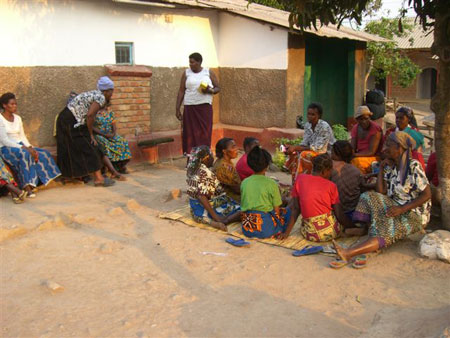
Morning gathering
The day began with a meeting of the newly formed "men's cooperative." So far our partnerships in Kantolomba have been mostly with the women. It was natural, given our needs for the project and the culture existing in the compound, that this would be so. During the summer trip, however, Cheri, in one of her regular flashes of insight and inspiration, realized that the time had come to bring the men on board. The men need support for their growth out of poverty as much as the women do, and we are now ready to assist.
The men in Kantolomba are in a really tough spot. They have no work, and without work have no productive role in their community. Strong gender expectations prevail that do not permit the men to contribute as they otherwise might. We have seen some evidence this trip that the roles the men are trapped in are slowly breaking up: men and women out and about as couples, for example; men holding babies and caring for young children in active ways, and so on. The other day our driver, Simon, asked if we might take a detour in order to pick up his two beautiful daughters from school. We said yes, and were privileged to see how proud he is of them, and how much he obviously participates in their care. There are plenty of men like this around. Still, most men that we see, having no traditional way to contribute to the community, drink or follow other self-destructive pathways instead.
We began to bring the men into the project with Friday and his carpentry team. Soon afterwards, these men and others who have worked on the building at one time or another, seeing the good things happening for the women, formed the "Men's cooperative" as a way of coming together to support each other and do some good for the community. This morning was their first official meeting.
The meeting was attended by all the male employees of Living Compassion, including the security guards and the two new carpenters, plus John, the plumber mentioned yesterday, and James, the foreman of the building project. Friday facilitated the conversation and translated.
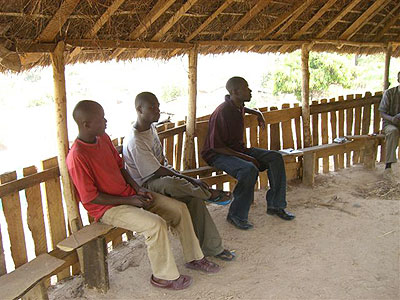
Charles, Evaristo, and Peter
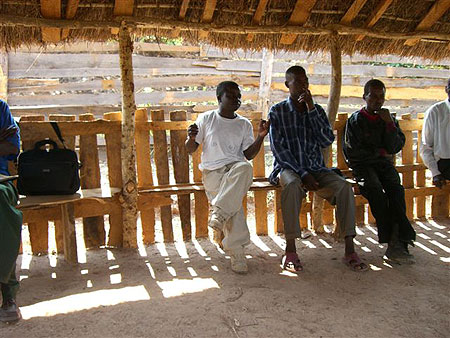
Winter, Rubin, and Christopher
First the men congratulated themselves on being there: this was likely the first meeting of its kind in Kantolomba, they said. They then went on to the main topic of discussion: what are the difficulties facing the men in Kantolomba, and what can be done to make a difference?
Everyone agreed that the main problem is the lack of employment. All the other troubles men have stem from this one. What is needed, they said, is industry. The men need work to do that enables them to help support their families and their community, and gives them a purpose in living day to day. They need something to be proud of. We need to create industry, they said, that will bring people to Kantolomba for goods and services, and bring their money with them. Several possibilities were suggested: we could make concrete blocks or bricks, they said; we could start a commercial farm; or (this was the most popular idea by far) we could create a welding shop where people could buy window frames like the ones in our very own building.
If the cooperative could acquire some capital, then tools and raw materials could be purchased, and production could begin. After people were compensated for their labor, any money that was made would go back into the cooperative to buy the next batch of materials and gradually expand the business. Someone mentioned that there has been talk of the possibility of opening a store to sell chitenge dresses or other tailored items, tie-dyed cloth (one of the industries that the women are contemplating), perhaps enriched baked good, and other things. With this an exciting vision opened up for all of us, it seemed. Someone might come to the property for a load of blocks, to have something welded, or to have some tailoring done. They might come for water or health care, or for some healthy food. We might develop a reputation as the place to go for well-made goods and reliable services, and in this way bring money and work to the community. The men all agreed: this is something we want to do.
Next, the men named AIDS as the second largest challenge facing the men of Kantolomba. Men do not take the disease seriously, they said, and so they create huge problems for everyone, including themselves. Men need to be educated about the situation, convinced of the necessity of having themselves tested for the virus, and counseled about ways to take responsibility for the crisis that is happening. "How can we do this?" they asked themselves. "By being examples," they answered. The men of Kantolomba need models of men who are not hemmed in by tradition and are willing to take the steps necessary to protect themselves and others.
Last, we discussed the drinking problem in the community. This led quickly back to the problem of employment, because, the men said, this is the main problem, not the drinking. The men drink only because they have nothing else to do.
This conversation took about an hour and a half. It appeared as if everyone was pleased with it. Towards the end the women, who were assembled below us near the kitchen building (we met in the new insaka up on the hill), began singing. It was most pleasant to sit there with those guys, talking hopefully about the challenges they face, while the breeze carried the women's voices up to us. Finally, we stood up to shake hands on our accomplishment.
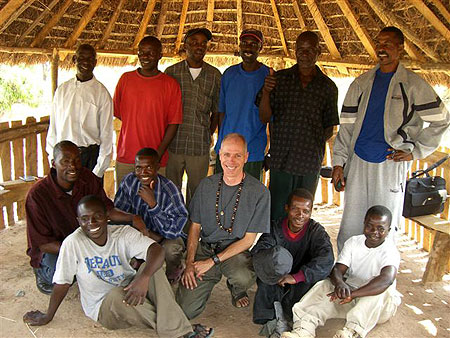
The Men's Cooperative
The women were ready for us when we descended. "Have you finished?" asked Theresa. We told her that we had. "Then we must go!" she said.
"Where are we going?" we asked.
"You will see!"
At this the women--all 23 of them--began to sing at the top of their voices. They formed themselves into a parade and began to dance their way slowly past the gate and out onto the road, all the while singing like angels. Over and over they sang the same song while they danced, clapping their hands and cheering between verses.
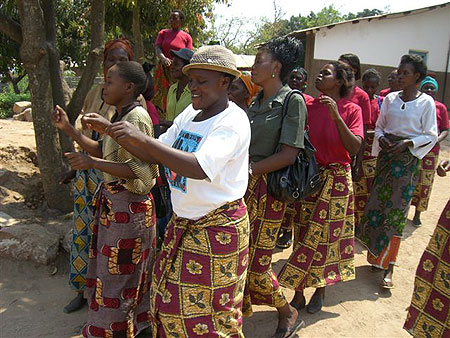
The parade begins
Theresa translated the words of the song. They went something like this:
The Lord has made a way for us. Look at what Living Compassion has done! You can even see it--we are amazed!
Soon we reached Anne's house, which was nearby. The women all gathered in front of the house with Anne in front, dancing. Anne then began to lead them in a new song, which they sang with all of their hearts while they danced and pointed up to Anne's new roof.
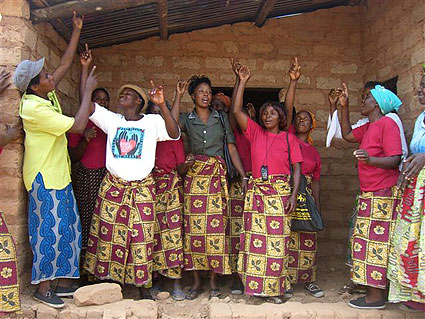
At Anne's house
Translated, the song went:
Come and see what the Lord has done for me. I have a roof! I have food to eat! Thank you, Living Compassion!
At the end Theresa shouted, "What have we found here, ladies?"
They all pointed up and shouted in return: "We have found a roof!"
Then they broke into the original song, paraded out into the road, and sang and danced their way to the next house with a new roof, then the next, all through the compound, until they had celebrated at every one in the same way. The people in the community gaped at us as we went by. Soon we had dozens of children dancing with us and following along. It was a most amazing celebration.
From here the pictures will speak for themselves.
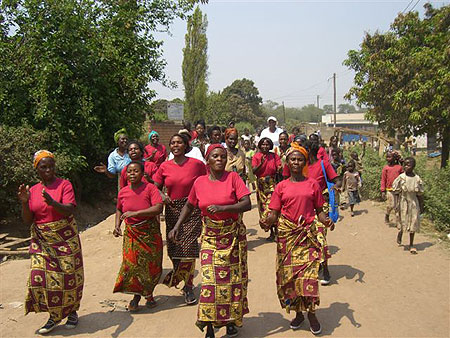
Parading down the main road.
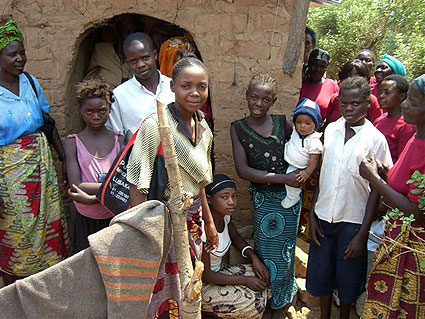
Josephine and her family in front of their house.
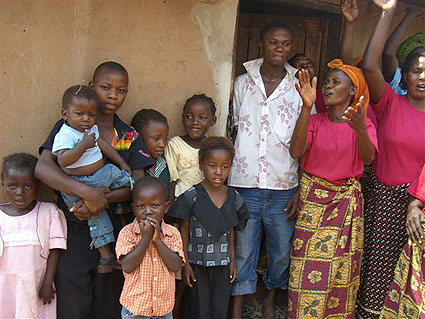
Foster and her family in front of their house.
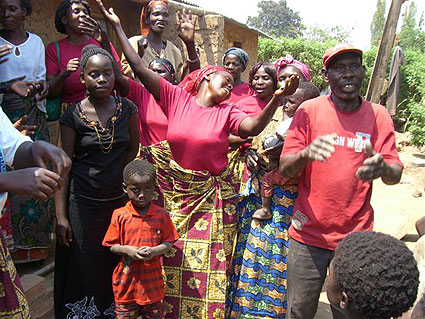
Joy in Kantolomba
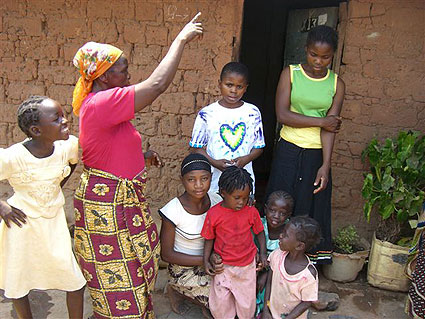
Christina and her family
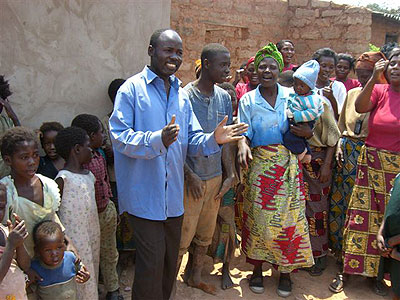
Beatrice, her husband Donald, and family
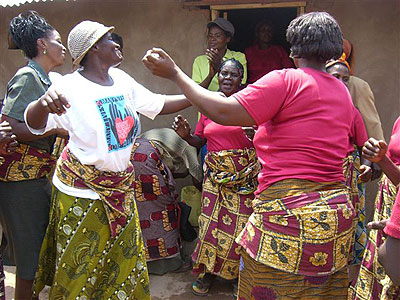
Violet's house
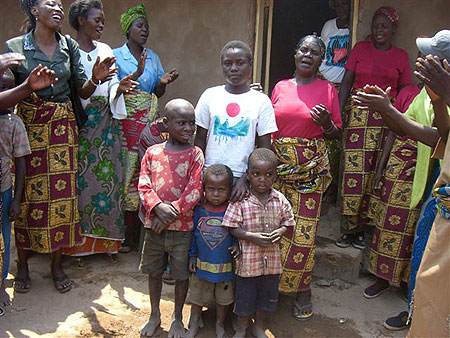
Violet with her grandchildren
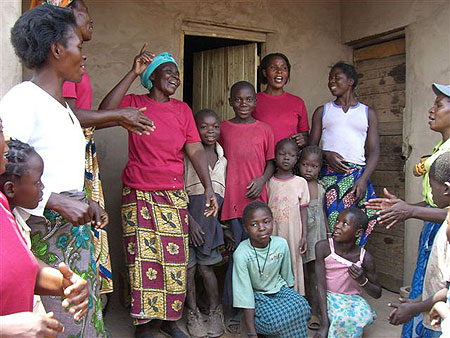
Angela and Martha with their families
The parade lasted a good hour and a half, and the women never stopped singing the whole time. Sweat poured from their faces, but their smiles never faded for an instant. Veronica sang so hard that she was unable to speak afterwards. Finally, we all ended up where we began, sitting behind the kitchen building. Together the women sang one last, slow, song, very softly, then they cheered and were finished.
If only everyone reading these words could have been there to see the joy of those people! So much good has happened here! Anyone who has given money to support the work, or who has raised funds from others, or who has participated in a retreat, or an email class, or the radio show, or any other way, has a share in these people's happiness. Let us all be grateful for the good we have done.
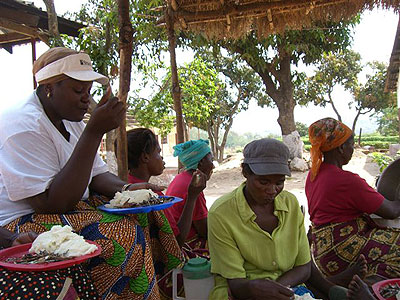
"Time for nchima!"
